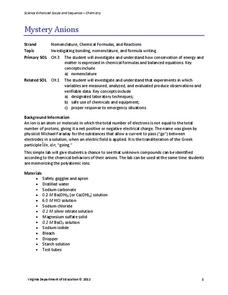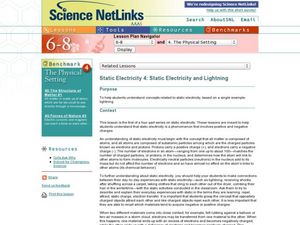Virginia Department of Education
Mystery Anions
Lost an electron? You should keep an ion them. Young chemists learn qualitative analysis in the second lesson of an 11-part chemistry series. After observing reactions of simple salts, the teacher provides pupils with unknown...
It's About Time
Are Atoms Invisible?
Wow, an experiment that allows the class to participate in a missile war! Pupils discuss Thomsons's theory of cathode rays and simulate Rutherford's historical experiment to learn about atomic structure. They conclude this fourth...
Curated OER
Amazing Water Changes
Students explore the properties of water and how it changes states. In this kindergarten to 2nd grade science lesson, students pair a hands-on science activity with two suggested books. This inquiry lesson has...
Curated OER
Water and Ice
Students observe water as it changes form. In this water instructional activity students observe, measure, and describe water as it changes state.
Curated OER
Water and Ice
Students examine water. In this chemistry lesson, student examine the physical properties of water and how it changes from a liquid to a solid or a gas. This lesson contains links to a second and third complimentary lesson on...
Curated OER
Solution Chemistry Investigation
Learners engage in a lesson that is concerned with the concepts related to solution chemistry. They calculate the molar mass of various chemical compounds. Then students predict the anion ratio for ionic compounds. Learners also write...
Curated OER
Magnetic Domain
Students participate in activities in which they examine magnetic domains. They analzye how different colored metals and how they react to magnets.
Curated OER
Plotting a Magnetic Field
High schoolers experiment with a set of materials. They plot the magnetic field that arises from a regular bar magnet. They discover how a magnet affects a compass.
Curated OER
Properties of Magnets
High schoolers determine the physical properties of magnets. They analyze the size, number of poles and strength of the magnets. They make observations of what happens to magnets when they are placed next to each other.
Curated OER
Checkbook
Develop life skills through the use of an AppleWorks Banking kit, a spreadsheet program, and a role play activity. This life skills lesson utilizes technology plus busines and social studies principles. Note: All materials...
Curated OER
The Nervous System from A to Z
In this nervous system alphabet book worksheet, students study 26 neuroscience terms as they read the 26 terms and their definitions in the glossary. Some of the terms included are: receptor, unipolar, white matter, axon, hemisphere,...
Science4Fun
Science4 Fun: Resistors, Capacitors, and Inductors
Electric circuits are used to provide a path to electric current. They commonly use three basic electrical components, which are resistors, capacitors, and insulators. They affect the electric current and changes the behavior of the...













